Module 4 Unit 1 Everyone will study at home 课件(共42张PPT)
文档属性
| 名称 | Module 4 Unit 1 Everyone will study at home 课件(共42张PPT) |  | |
| 格式 | ppt | ||
| 文件大小 | 4.8MB | ||
| 资源类型 | 教案 | ||
| 版本资源 | 外研版 | ||
| 科目 | 英语 | ||
| 更新时间 | 2022-05-25 20:53:47 | ||
图片预览

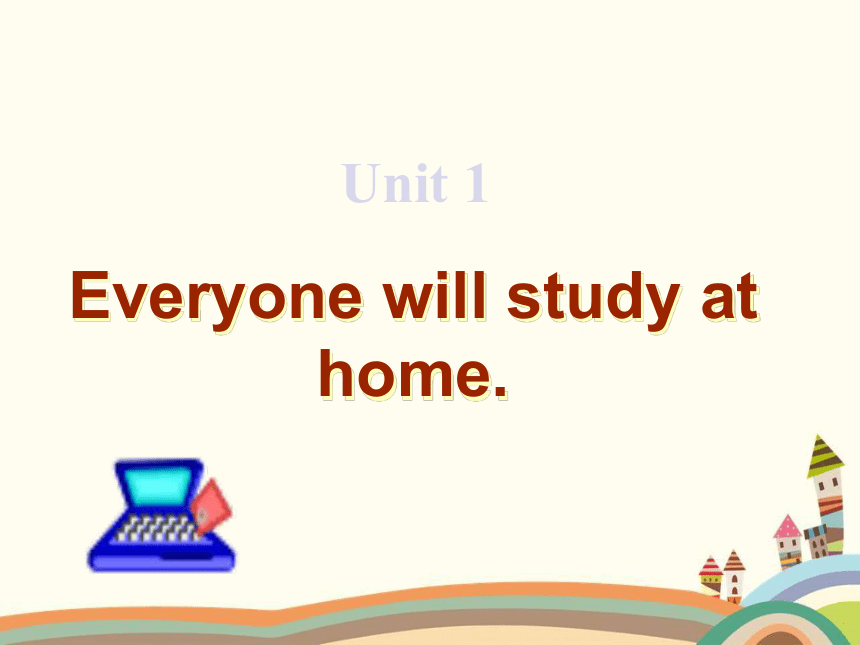
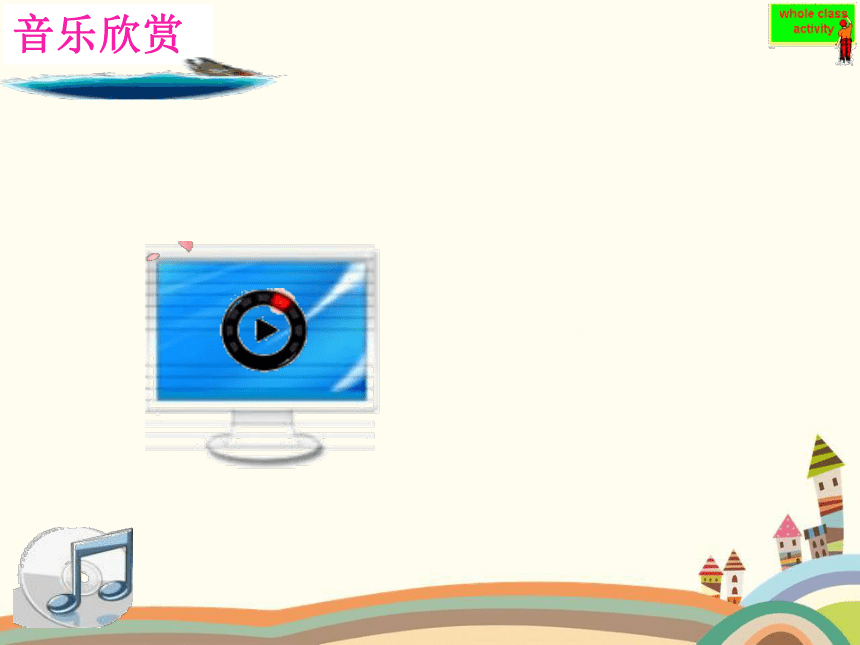


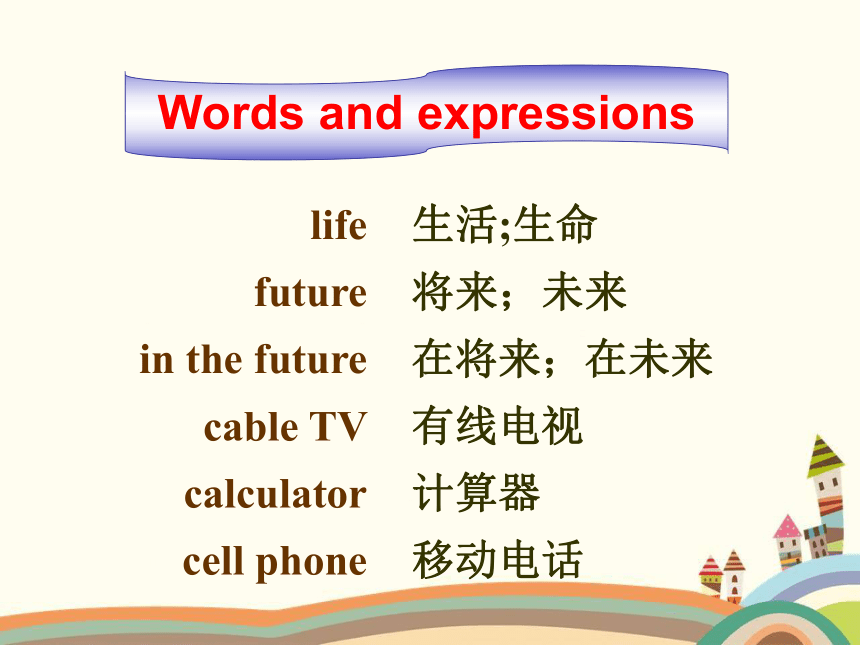
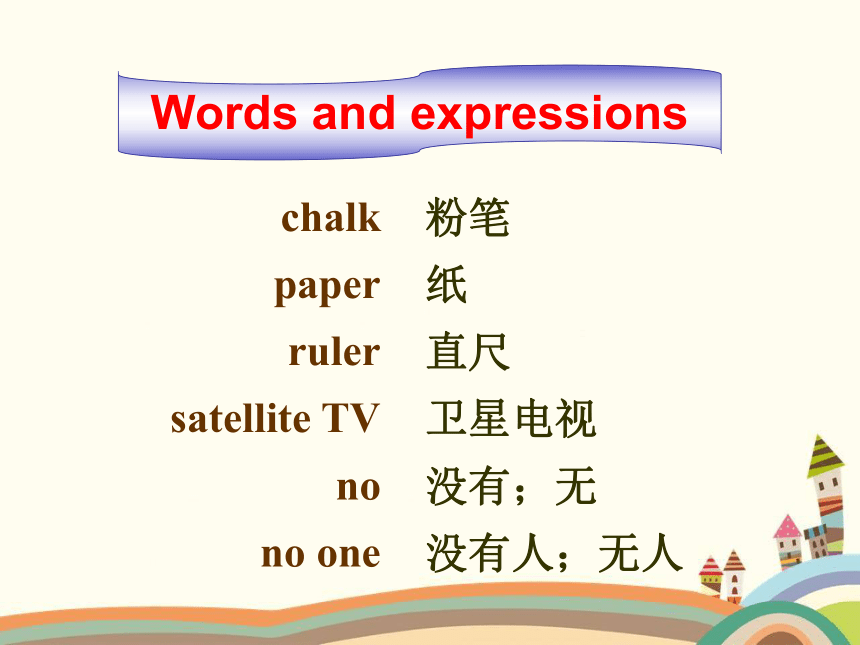
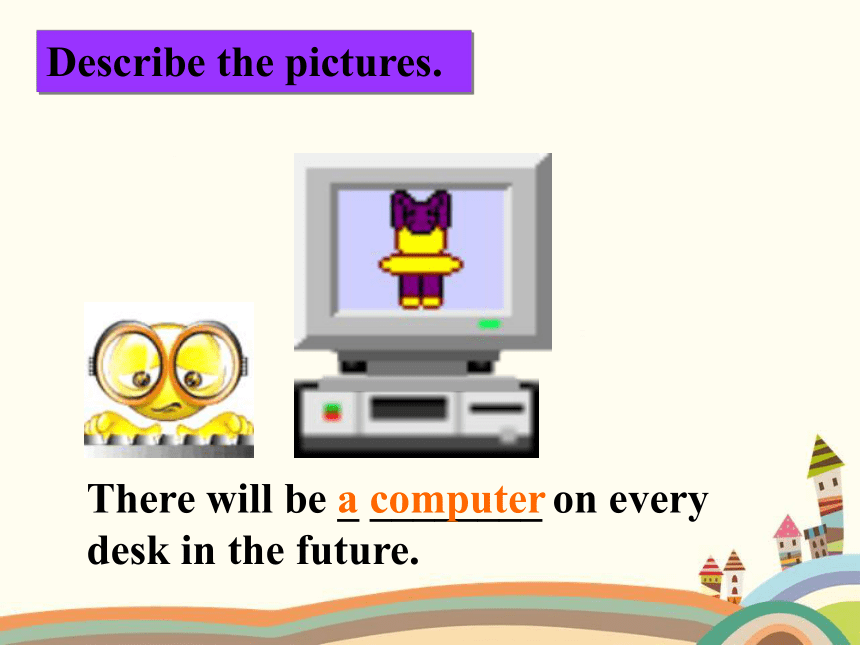


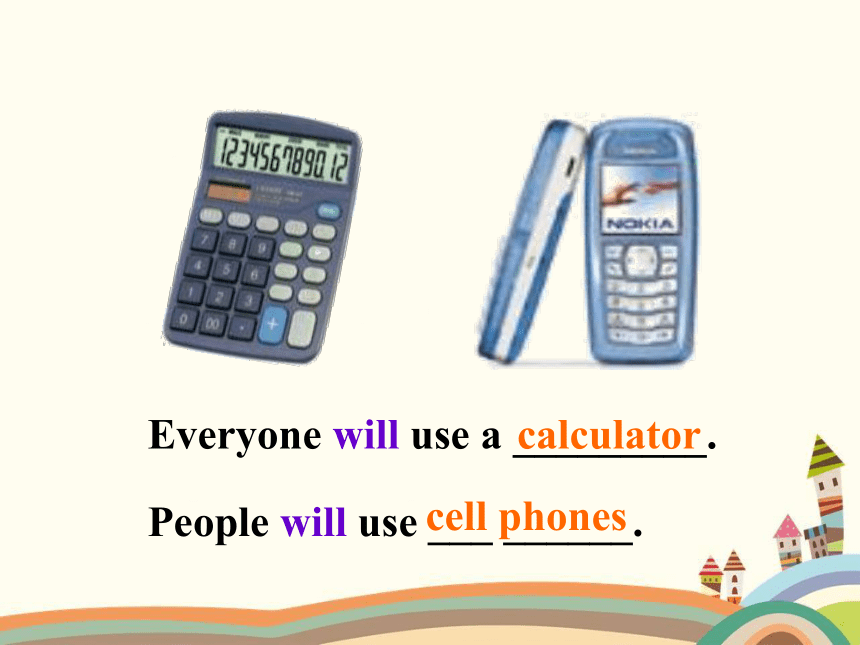
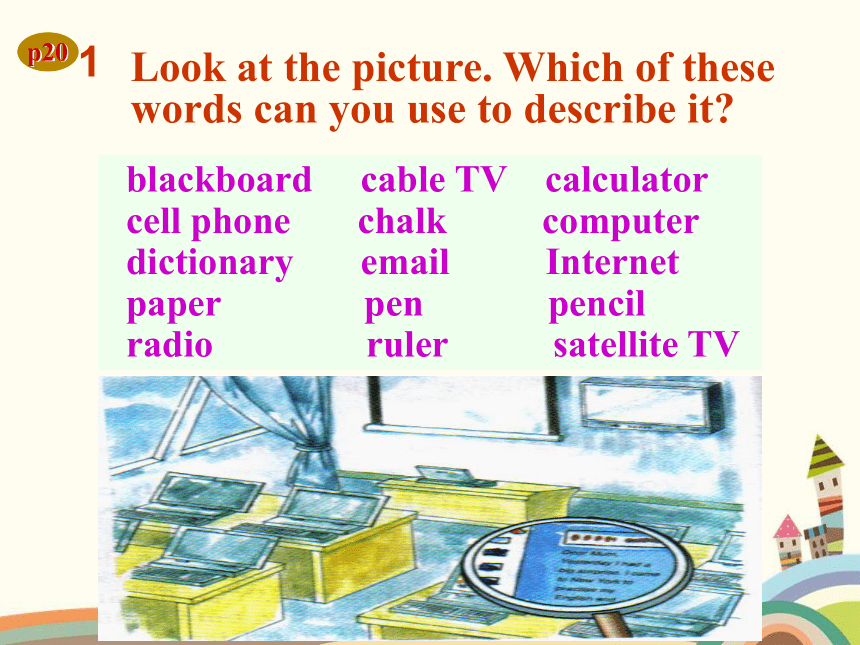
文档简介
(共42张PPT)
Module 4
Everyone will study at home.
Unit 1
音乐欣赏
Where will we study
at home
At school
or
想一想
Words (P)review
life
future
in the future
cable TV calculator
cell phone
Words and expressions
生活;生命
将来;未来
在将来;在未来
有线电视
计算器
移动电话
chalk
paper
ruler
satellite TV
no
no one
粉笔
纸
直尺
卫星电视
没有;无
没有人;无人
Words and expressions
There will be _ ________ on every desk in the future.
a computer
Describe the pictures.
There will be a _______ ____ in the future.
satellite TV
We will have a _____ ___ in the future.
cable TV
People will use ___ ______.
Everyone will use a _________.
calculator
cell phones
blackboard cable TV calculator
cell phone chalk computer
dictionary email Internet
paper pen pencil
radio ruler satellite TV
Look at the picture. Which of these words can you use to describe it
1
p20
I use a pen and a dictionary to study English.
I don’t use a calculator to study English.
Say what you use to study English and talk about your class.
2
I use paper to study English.
I don’t use a piece of paper to study English.
Everyone uses a pen and a dictionary to study English.
No one uses a calculator to study English.
Listen and check.
Betty Daming
Everyone will study at
home in the future.
Everyone will send their homework to the teacher by email.
There will be a computer
on every desk in the future.
Everyone will use paper,
pens and pencils.
√
√
√
4
Listen and read.
5
Will students go to school or study at home
They won’t __________.
They will _____________.
go to school
study at home
∨
∨
∧
Will students read in the library or on their computers
∨
∨
∧
They won’t read ____________.
They will read _________________.
in the library
on their computers
Will students send their homework by email or hand it in
∨
∨
∧
They _____ hand it in.
won’t
They ___ send it by email.
will
Will students use books or computers
They ______ use books.
They ____ use computers.
∨
∨
∧
won’t
will
Language Points
I think that everyone will study at home and will use computers. They won’t use books.
我想人人都会在家里学习,用计算机学习。他们不用课本。
当 everyone 或 everybody 作主语时,其后的代词一般不用he, him, his,而用复数形式they, them, their, 以避免性别歧视。
Everyone can be good students if they study hard.
如果努力学习,每个人都可以成为好学生。
2. Will there be schools in the future
将来会有学校吗?
一般将来时态在 there be 句型中
就是“There will be …”。如:
There will be a park over there.
那边将建成一个公园。
be going to 也可以用在 there be 句型
中,但应注意该句型有单复数的变化。
如:
There is going to be an English party
this weekend.
本周末有一个英语晚会。
3. And will they send their homework to the teachers by email ”
他们将通过电子邮件将作业发给老师吗?
介词 by 表示方法、方式,意思是“通过……,靠……”。同学们需要注意的是,by后面直接跟单数名词,且不加冠词。如:
I go to school by bike every day.
我每天骑自行车去上学。
My brother will go to Germany by plane. 我弟弟将坐飞机去德国。
B=Betty; D=Daming
B: ___ _____ __ schools in the ______
D: No, there won’t. I think that everyone
_________ at home and _______
computers. They _________ books.
They’ll use the Internet.
B: And will they send their homework to
the teachers ________
Read and complete the dialogue.
future
will study
will use
won’t use
by email
Will there be
D: Yes, they will. And students
_______ to their teachers on their
computers.
B: I’m not sure. I think students _______
computers, but in school. Everyone
__________________ on their desk.
They ________ books or use the
Internet. The teachers __________ on
a blackboard with chalk. And no one
_______ paper, pencils and pens!
will talk
will use
will have a computer
will read
won’t write
will use
课堂练习答案
1 Will students go to school in the future
2 Will they study at home
6
3 Will everyone send their homework by
email
4 Will there be teachers
5 Will there be computers in school
No, they won’t.
Yes, they will.
Yes, they will.
Yes, there will.
Yes, there will.
Choose the best answer to each question.
6 Will we read books in the future
7 Will teachers use a blackboard and chalk
8 Will students use paper, pencils and pens
Yes, we will.
No, they won’t.
No, they won’t.
Speaking
Talk about what your school will be like in 10 years.
讲讲十年之后你的学校会是什么样子。
Example:
A: In ten years, we’ll send our homework by email.
B: Yes, we’ll study at home, …
8
Work in pairs.
A: In ten years, we’ll send our
homework by email.
B: Yes, we’ll study at home.
A: We won’t use books. We
will use computers. We will
have a computer on the desk.
B: Yes, no one will use paper,
pencils and pens.
Sample:
Our future life
Culture Corner
未来主义是发端于20世纪的艺术思潮。未来主义的滥觞最早出现于1907年,意大利作曲家弗鲁奇奥·布索尼的著作《新音乐审美概论》被看作未来主义的雏形。未来主义思潮主要产生和发展于意大利一国,却也对其他国家产生了影响,俄罗斯尤为明显。
未来主义艺术家们的创作兴趣涵盖了所有的艺术样式,包括绘画、雕塑、诗歌、戏剧、音乐,甚至延伸到烹饪领域。
意大利诗人菲利波·托马索·马里内蒂最早于1909年发表《未来主义者宣言》一文,宣扬他的艺术观点。马里内蒂总结了未来主义的一些基本原则,包括对陈旧思想的憎恶,尤其是对陈旧的政治与艺术传统的憎恶。马里内蒂和他的追随者们表达了对速度、科技和暴力等元素的狂热喜爱。汽车、飞机、工业化的城镇等等在未来主义者的眼中充满魅力,因为这些象征着人类依靠技术的进步征服了自然。
马里内蒂这种狂热的艺术观点立刻征服了那些米兰的画家们。波丘尼、卡拉和鲁索罗等人在视觉艺术领域发扬了马里内蒂的未来主义观念。鲁索罗同时还是一位作曲家,他将未来主义元素引入了音乐领域。画家巴拉和塞韦里尼于1910年结识了马里内蒂。这些人构成了第一批未来主义艺术家。
下面请大家欣赏几幅代表作:
未来主义画家鲁索罗 (Russolo) 的“一辆乐观的汽车” ,1911年。
未来主义画家塞弗里尼(Severini)的“红磨坊的舞者”, 1919年。
奇里科“无法理解的忧愁” (Melancolie hernetique ) 1919年。
奇里科充满神奇的形而上画作。
形而上画家奇里科的“阿波里纳画像” (Potrrain G Apollinaire )1914年。
封达纳的“空间交响曲T-10” 4, 1958年。
封达纳的 “上帝之死” (La fine di Dio), 1963-64年。
Homework
Learn by heart the new words and expressions learnt in this class.
Bye-bye !
Module 4
Everyone will study at home.
Unit 1
音乐欣赏
Where will we study
at home
At school
or
想一想
Words (P)review
life
future
in the future
cable TV calculator
cell phone
Words and expressions
生活;生命
将来;未来
在将来;在未来
有线电视
计算器
移动电话
chalk
paper
ruler
satellite TV
no
no one
粉笔
纸
直尺
卫星电视
没有;无
没有人;无人
Words and expressions
There will be _ ________ on every desk in the future.
a computer
Describe the pictures.
There will be a _______ ____ in the future.
satellite TV
We will have a _____ ___ in the future.
cable TV
People will use ___ ______.
Everyone will use a _________.
calculator
cell phones
blackboard cable TV calculator
cell phone chalk computer
dictionary email Internet
paper pen pencil
radio ruler satellite TV
Look at the picture. Which of these words can you use to describe it
1
p20
I use a pen and a dictionary to study English.
I don’t use a calculator to study English.
Say what you use to study English and talk about your class.
2
I use paper to study English.
I don’t use a piece of paper to study English.
Everyone uses a pen and a dictionary to study English.
No one uses a calculator to study English.
Listen and check.
Betty Daming
Everyone will study at
home in the future.
Everyone will send their homework to the teacher by email.
There will be a computer
on every desk in the future.
Everyone will use paper,
pens and pencils.
√
√
√
4
Listen and read.
5
Will students go to school or study at home
They won’t __________.
They will _____________.
go to school
study at home
∨
∨
∧
Will students read in the library or on their computers
∨
∨
∧
They won’t read ____________.
They will read _________________.
in the library
on their computers
Will students send their homework by email or hand it in
∨
∨
∧
They _____ hand it in.
won’t
They ___ send it by email.
will
Will students use books or computers
They ______ use books.
They ____ use computers.
∨
∨
∧
won’t
will
Language Points
I think that everyone will study at home and will use computers. They won’t use books.
我想人人都会在家里学习,用计算机学习。他们不用课本。
当 everyone 或 everybody 作主语时,其后的代词一般不用he, him, his,而用复数形式they, them, their, 以避免性别歧视。
Everyone can be good students if they study hard.
如果努力学习,每个人都可以成为好学生。
2. Will there be schools in the future
将来会有学校吗?
一般将来时态在 there be 句型中
就是“There will be …”。如:
There will be a park over there.
那边将建成一个公园。
be going to 也可以用在 there be 句型
中,但应注意该句型有单复数的变化。
如:
There is going to be an English party
this weekend.
本周末有一个英语晚会。
3. And will they send their homework to the teachers by email ”
他们将通过电子邮件将作业发给老师吗?
介词 by 表示方法、方式,意思是“通过……,靠……”。同学们需要注意的是,by后面直接跟单数名词,且不加冠词。如:
I go to school by bike every day.
我每天骑自行车去上学。
My brother will go to Germany by plane. 我弟弟将坐飞机去德国。
B=Betty; D=Daming
B: ___ _____ __ schools in the ______
D: No, there won’t. I think that everyone
_________ at home and _______
computers. They _________ books.
They’ll use the Internet.
B: And will they send their homework to
the teachers ________
Read and complete the dialogue.
future
will study
will use
won’t use
by email
Will there be
D: Yes, they will. And students
_______ to their teachers on their
computers.
B: I’m not sure. I think students _______
computers, but in school. Everyone
__________________ on their desk.
They ________ books or use the
Internet. The teachers __________ on
a blackboard with chalk. And no one
_______ paper, pencils and pens!
will talk
will use
will have a computer
will read
won’t write
will use
课堂练习答案
1 Will students go to school in the future
2 Will they study at home
6
3 Will everyone send their homework by
4 Will there be teachers
5 Will there be computers in school
No, they won’t.
Yes, they will.
Yes, they will.
Yes, there will.
Yes, there will.
Choose the best answer to each question.
6 Will we read books in the future
7 Will teachers use a blackboard and chalk
8 Will students use paper, pencils and pens
Yes, we will.
No, they won’t.
No, they won’t.
Speaking
Talk about what your school will be like in 10 years.
讲讲十年之后你的学校会是什么样子。
Example:
A: In ten years, we’ll send our homework by email.
B: Yes, we’ll study at home, …
8
Work in pairs.
A: In ten years, we’ll send our
homework by email.
B: Yes, we’ll study at home.
A: We won’t use books. We
will use computers. We will
have a computer on the desk.
B: Yes, no one will use paper,
pencils and pens.
Sample:
Our future life
Culture Corner
未来主义是发端于20世纪的艺术思潮。未来主义的滥觞最早出现于1907年,意大利作曲家弗鲁奇奥·布索尼的著作《新音乐审美概论》被看作未来主义的雏形。未来主义思潮主要产生和发展于意大利一国,却也对其他国家产生了影响,俄罗斯尤为明显。
未来主义艺术家们的创作兴趣涵盖了所有的艺术样式,包括绘画、雕塑、诗歌、戏剧、音乐,甚至延伸到烹饪领域。
意大利诗人菲利波·托马索·马里内蒂最早于1909年发表《未来主义者宣言》一文,宣扬他的艺术观点。马里内蒂总结了未来主义的一些基本原则,包括对陈旧思想的憎恶,尤其是对陈旧的政治与艺术传统的憎恶。马里内蒂和他的追随者们表达了对速度、科技和暴力等元素的狂热喜爱。汽车、飞机、工业化的城镇等等在未来主义者的眼中充满魅力,因为这些象征着人类依靠技术的进步征服了自然。
马里内蒂这种狂热的艺术观点立刻征服了那些米兰的画家们。波丘尼、卡拉和鲁索罗等人在视觉艺术领域发扬了马里内蒂的未来主义观念。鲁索罗同时还是一位作曲家,他将未来主义元素引入了音乐领域。画家巴拉和塞韦里尼于1910年结识了马里内蒂。这些人构成了第一批未来主义艺术家。
下面请大家欣赏几幅代表作:
未来主义画家鲁索罗 (Russolo) 的“一辆乐观的汽车” ,1911年。
未来主义画家塞弗里尼(Severini)的“红磨坊的舞者”, 1919年。
奇里科“无法理解的忧愁” (Melancolie hernetique ) 1919年。
奇里科充满神奇的形而上画作。
形而上画家奇里科的“阿波里纳画像” (Potrrain G Apollinaire )1914年。
封达纳的“空间交响曲T-10” 4, 1958年。
封达纳的 “上帝之死” (La fine di Dio), 1963-64年。
Homework
Learn by heart the new words and expressions learnt in this class.
Bye-bye !
同课章节目录
- Module 1 Lost and found
- Unit 1 Whose bag is this?
- Unit 2 Are they yours?
- Unit 3 Language in use
- Module 2 What can you do ?
- Unit 1 I can play the piano
- Unit 2 I can run really fast
- Unit 3 Language in use
- Module 3 Making plans
- Unit 1 What are you going to do at the weekends?
- Unit 2 We're going to cheer the players.
- Unit 3 Language in use
- Module 4 Life in the future
- Unit 1 Everyone will study at home
- Unit 2 Every family will have a small plane.
- Unit 3 Language in use
- Module 5 Shopping
- Unit 1 What can I do for you?
- Unit 2 You can buy everything on the Internet
- Unit 3 Language in use
- Module 6 Around town
- Unit 1 Could you tell me how to get to the Nationa
- Unit 2 The London Eye is on your right.
- Unit 3 Language in use
- Revision module A
- Module 7 My past life
- Unit 1 I was born in a small village.
- Unit 2 I was born in Quincy.
- Unit 3 Language in use
- Module 8 Story time
- Unit 1 Once upon a time….
- Unit 2 Goldilocks hurried out of the house.
- Unit 3 Language in use
- Module 9 Life history
- Unit 1 He left school and began work at the age of
- Unit 2 He decided to be an actor.
- Unit 3 Language in use
- Module 10 A holiday journey
- Unit 1 What did you do?
- Unit 2 This morning we took a walk.
- Unit 3 Language in use
- Module 11 Body language
- Unit 1 They touch noses!
- Unit 2 Here are some ways to welcome them.
- Unit 3 Language in use
- Module 12 Western music
- Unit 1 It's so beautiful!
- Unit 2 Vienna is the centre of European classical
- Unit 3 Language in use
- Revision module B
